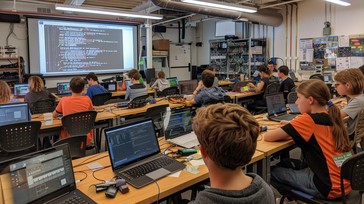In recent years, a significant shift has emerged in how Gen Z defines success, particularly concerning education and career choices. This generation, born between the mid-1990s and early 2010s, has grown up in a digital age where information and opportunities are just a click away. Unlike previous generations who often equated success with high grades and traditional professional careers in law, medicine, and engineering, Gen Z is broadening the scope of success by exploring new, unconventional paths like technology, entrepreneurship, and creative industries where creativity and personal fulfilment are equally important as financial security. They are also reshaping how society views academic pressure and mental health, prioritising their well-being over societal expectations.
For many Gen Z individuals, the definition of success has expanded. Gen Z is gravitating toward tech conferences and workshops, where young professionals gain knowledge, network, and explore emerging industries like artificial intelligence, blockchain, and digital marketing. These events provide access to the tools and insights needed to succeed in a rapidly evolving job market, illustrating that education is no longer confined to traditional classrooms.

This move away from conventional career paths is fueled by Gen Z’s desire for flexibility, innovation, and control over their own lives. The rise of the gig economy and freelance work offers this generation an alternative to the rigid structure of nine-to-five jobs. Rather than simply aiming for prestigious titles, many are developing skills in programming, data analysis, UX design, and social media marketing—fields that are not only in demand but also offer autonomy. Gen Z understands that in today’s digital world, success is no longer linear; it’s about acquiring a diverse skill set and being adaptable. They are using online platforms like Coursera and Udemy to gain these skills, often bypassing traditional higher education or combining both which favors a more tailored and specialized learning opportunity.
As Gen Zs explore these non-traditional careers, they are also making mental health a top priority in their lives. Unlike older generations, who often felt compelled to sacrifice personal well-being for academic and career achievements, the new generation is vocal about the importance of mental health. They are aware of the dangers posed by academic pressure and burnout and are actively pushing back against the notion that grades and degrees are the sole indicators of success. For many, mental well-being is seen as essential to long-term success and happiness, and they are advocating for a healthier balance between work, study, and personal care.

The pressures that accompany academic success have long been a source of stress for students, especially those pursuing rigorous programs in traditional professions. Many Gen Z students, however, are choosing not to let grades define them. For instance, more students are taking breaks when they feel overwhelmed or seeking therapy to help manage stress. As a result, institutions are seeing a growing demand for counselling services, mental health days, and reduced academic workloads to accommodate students’ mental well-being.
Social media has played a significant role in reshaping how Gen Z approaches mental health because platforms like TikTok, Instagram, and YouTube are filled with influencers, therapists, and mental health advocates who share personal experiences, coping strategies, and tips for managing stress. This openness has made discussions about mental health more accessible, destigmatized therapy, and encouraged young people to seek help when they need it. This is a shift from how the previous generations may have viewed therapy or mental health breaks as a sign of weakness, Gen Z recognizes them as vital tools for maintaining balance and preventing burnout.

One key difference in Gen Z’s approach to success is their understanding that personal fulfilment and career satisfaction are deeply linked to mental health. Many young people are no longer willing to sacrifice their happiness or well-being in pursuit of traditional success markers. This generation values flexibility and balance, whether it’s choosing to work remotely, pursue creative endeavours, or engage in entrepreneurial ventures. As a result, they are driving a broader cultural shift toward redefining success as a multifaceted concept that includes emotional, psychological, and physical well-being alongside professional achievements.
Educational institutions are beginning to respond to this shift in priorities by implementing policies that address the mental health needs of students. Universities are expanding access to counselling services and incorporating mental health awareness programs into their curricula. This cultural change is not only improving the academic environment for Gen Z but is also challenging the traditional metrics of academic success, making room for a more balanced approach.
Despite these changes, Gen Z’s relationship with mental health and academic success is still a work in progress. There remains societal pressure to conform to traditional standards of achievement, but this generation has shown resilience in breaking away from those expectations. In doing so, they are building a future where success is defined by individual fulfillment and mental well-being, rather than external validation through grades and conventional career milestones.
As Gen Zs continue to redefine success, educational systems should focus on creating environments that prioritize mental health, offer flexible learning opportunities, and foster creativity. Employers must recognize the importance of work-life balance and mental well-being, creating workplaces that support the holistic success of their employees. By embracing this shift, society can support Gen Z in their pursuit of a healthier, more balanced definition of success—one that values personal growth, mental well-being, and diverse career opportunities just as much as traditional achievements.
Thank you for being part of this community. If you are passionate about driving change through youth empowerment and workshops, send an email to info@insidesuccessnigeria.com. Find more related articles on our website. Kindly subscribe to our website and follow us on our Instagram @ insidesuccessnigeria to get more updates.



Leave a Reply